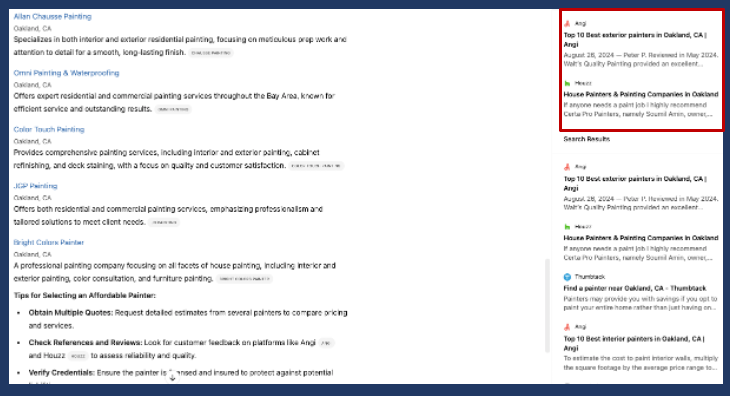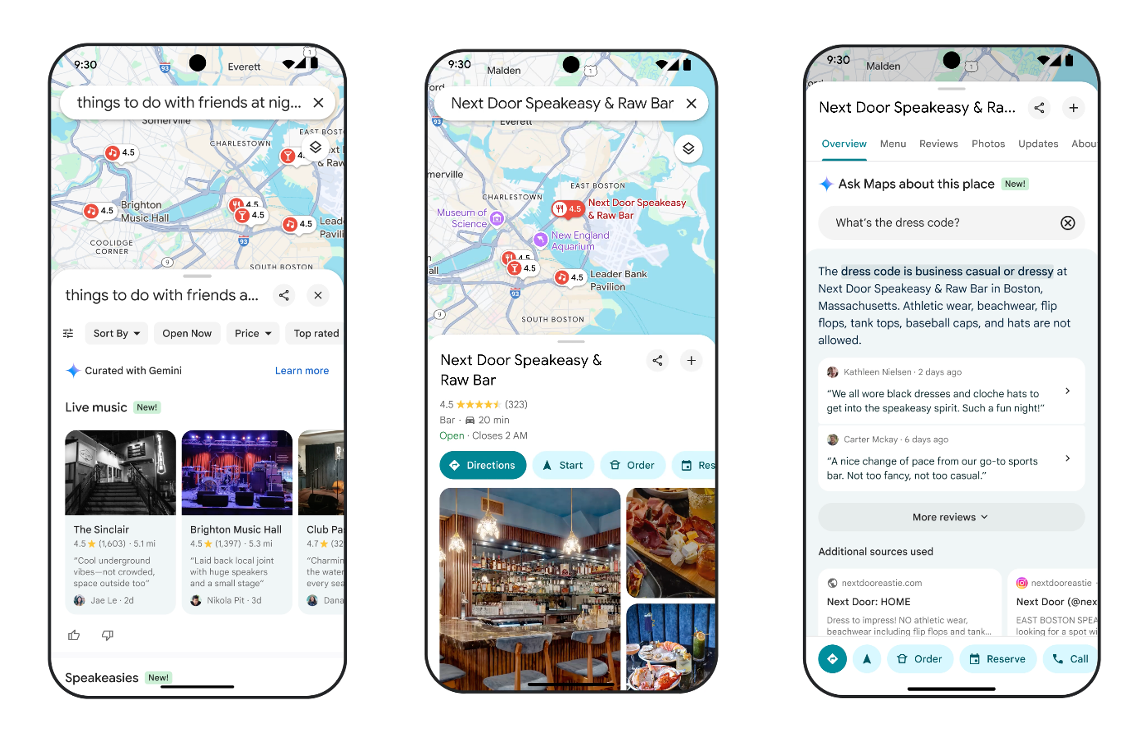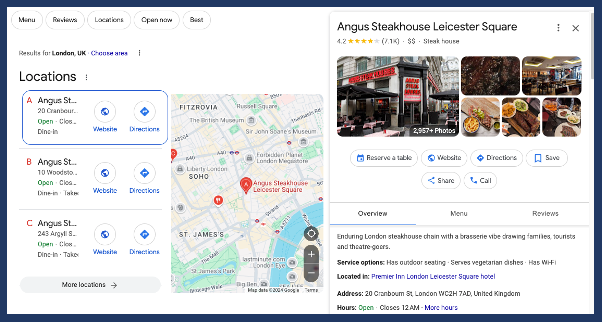LocalGPT, Maps' AI Makeover, London 'Lovebombing'

Please read this message about Near Media's future.
Local SEO for SearchGPT
Yesterday David conveyed his first impressions of SearchGPT, now integrated into ChatGPT. He concluded, "SearchGPT is the first product I've seen that could actually draw meaningful market share away from Google." And I agree (although I was apparently incorrect [so far] about Apple Maps in ChatGPT). Increasingly, people have been writing about SEO for LLMs. The consensus seems to be: do good SEO and it will generally work for ChatGPT, Gemini and Perplexity. Yext's Christian Ward argued at recent conference that listings management is highly relevant for AI (BrightLocal recently reaffirmed that key directories in verticals do matter.) While Yext's argument might be seen as self-serving, it's not necessarily wrong. When you perform, for example, a home services search on ChatGPT and open the "sources" pane, you'll see a mix of individual business listings and directories such as: Angi, Thumbtack, Houzz, Better Business Bureau, YP.com and (shockingly) Mapquest, among others. Individual business links also often take you to Google Maps, with obvious implications there. This is an evolving situation and could change significantly over time. But it starts to point toward a local SEO strategy, not that different from current local SEO strategy and which includes GBP optimization.

Our take:
- The result above, for "affordable house painters in 94611," shows "citations" from Angi, Houzz and Thumbtack. The red box (my add) in the upper right is probably where ads will eventually live.
- Perplexity, among other things, is using a Yelp data feed for local content, arguing obviously for Yelp optimization.
- SearchGPT is immature. Its source diversity and local data depth will grow. But we can figure out key directories by category and optimize accordingly.
Google Maps AI Makeover
Google said during its most recent earnings call that Maps now has a whopping 2 billion users. CEO Sundar Pichai also spoke about Gemini integration into Maps. The company further detailed those features in three (count 'em) blog posts this week. First the company said that Waze is getting "conversational reporting" for road incidents, where users can simply speak naturally to describe what's happening. Next, Google Maps platform will allow developers to use its "place data to build generative AI-powered experiences." Urban planners are going to get new AI-powered map/place data-analysis tools. And Google's Immersive View is receiving a big AI update. Google is also adding some new navigation features. But of more interest to us is the "curated with Gemini" Google Maps feature, which allows local searchers to ask broad questions ("for inspiration") using informal language. "Things to do with friends at night," is the example Google uses. You'll apparently be able to ask follow-up questions as well. This will be coming to search in the near future, Google added. The company also touted new AI-review summaries, which can be useful but are also a bit of a black box and can mask fraud. Google's initial attempts to integrate new AI features into Maps were largely unsuccessful. We'll see if they work better now.

Our take:
- One of the things that we like about SearchGPT is its ability to understand and remember (local) context, to make follow-up questions and refinements easier.
- Google is trying to duplicate that experience. But the current Google search and Maps UIs aren't well suited to that type of interaction. They'll have to change.
- If it works, however, it will mean more query volume and local ad impressions.
Google 'Lovebombed' to Stymie Tourists
The vast majority of internet users rely on local reviews when making purchase decisions. Yet Near Media user research has consistently found that most people don't read reviews, although they rely on review counts and ratings. Review fraud remains a major issue on Google and elsewhere. But in a very amusing, though problematic, development Londoners are reportedly generating a high volume of fake positive reviews for mediocre chain restaurants to fool Google rankings and lure tourists away from better local eateries. As Tim Capper writes, "This trend has grown into a coordinated, city-wide “lovebombing” campaign to attract tourists to mediocre restaurants, safely leaving the real hidden gems in local hands." It's also happening on Reddit, Twitter and Tripadvisor. Capper opines, "Google’s system has very little moderation and almost no algorithm to catch these deceptive reviews—especially if they’re positive." He identifies the reasons they're unlikely to be moderated: users are in London (local), they interact with Google in an authentic way (searching for businesses and engaging with GBPs), and Google's use of signals rather than "genuine user verification [allows] ... fake reviews to slide through undetected."

Our take:
- Google's review algorithm has become somewhat tighter over the past couple of years, likely in response to Europe's DSA. But that hasn't solved the problem.
- Ironically, all the visibility this effort generated may prompt Google to take manual action, where it otherwise would not have.
- Capper predicts the eventual decline of reviews if Google doesn't take a different approach. Already many younger people are turning to social and influencers to sidestep the "burdens" of sifting through SERPs and reviews.
Recent Analysis
- Way-Too-Early Thoughts on SearchGPT for Local, by David Mihm.
- Near Memo episode 180: A conversation with Raj Singh, founder of Soloist.ai, an AI-powered website builder.
Short Takes
- GBP's (potentially) new "learn something specific" box probably AI.
- ChatGPT answers "geotagging images" question correctly – partly.
- Andrew Shotland updates his "ChatGPT for local sucks" post (sucks less).
- Restaurant chains, not retailers, now anchor shopping malls.
- Amazon Q3 ad revenue jumped 19% to $14.3 billion.
- Microsoft search and ad revenue up 18%.
- iPhone 16 sales see strong demand despite weak Apple Intelligence.
- Google employees worried about more layoffs to fund AI.
- Google fined $20 decillion (?) for blocking Russian media on YouTube.
- Godaddy survey finds holiday shoppers more focused on SMBs this year.
- Google's Waymo autonomous vehicles unit now worth $45B.
Listen to our latest podcast.

How can we make this better? Email us with suggestions and recommendations.

